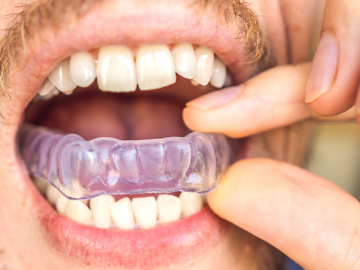
Posted on: 13 June, 2022
Tooth enamel is porous and inside our teeth are nerves which make them naturally sensitive, but too much sensitivity to temperature and other sensations can be uncomfortable.
4 minute read
Some people naturally have more sensitive teeth, but if a tooth has become more sensitive suddenly or over time, this is usually a sign of a problem and may need professional treatment.
Find out the common causes of sensitive teeth, the ways in which your dentist can help you manage tooth sensitivity and how to reduce or avoid it.
Tooth sensitivity or hypersensitivity means a tooth is more responsive to stimuli than normal. This could include:
Sensitivity may only be temporary or can be a long-term problem, and symptoms can range from mild to intense. You should see a dentist if you're worried about your teeth or if tooth sensitivity is affecting your daily life.
Teeth usually become more sensitive when the outer enamel layer is damaged or worn away. This can expose the more sensitive dentin layer underneath or even the soft pulp at the centre of the tooth.
Some people's teeth are naturally more sensitive if they have thinner enamel, but sensitivity can develop over time for a number of reasons. These include:
Brushing your teeth roughly doesn't make them cleaner, but it can damage the enamel and soft tissues in between teeth and cause sensitivity. Never brush teeth from side to side, instead use small circular motions with light pressure.
Using a toothbrush with hard bristles is also not recommended by dentists, and thankfully, most toothbrushes sold commercially nowadays will only have medium or soft bristles to choose from. Check for the bristle type on the packaging before you purchase your next toothbrush.
The natural bacteria in our mouths mix with sugars and carbohydrates from the food and drink we consume. This combination releases acids that can weaken tooth enamel. This is the process of tooth decay, which can eventually lead to small holes in teeth (tooth cavities) and tooth sensitivity.

Acid content in food and drink such as citrus fruits, soft drinks, white wine and vinegar can also wear down tooth enamel. Your teeth will also be at a higher risk of wear if you have a health condition that causes acid reflux or vomiting, such as gastroesophageal reflux disease (GERD).
Injuries to teeth such as chips and cracks can also expose the softer inner layers, as can damage to fillings, crowns or other dental restorations.
If tooth decay or damage reaches the soft tissue at the centre of the tooth (the pulp), this may lead to an infection or irritation of the tooth pulp, causing toothache and sensitivity. Tooth pulp infection is common and can be treated with root canal therapy.
With a proper oral hygiene routine, natural teeth can last a lifetime. However, it’s normal for teeth to be prone to regular wear and tear as we age. Over time, tooth enamel wears down and can cause sensitivity.
Plaque that builds up around the gum line can cause gums to inflame and become infected. This leads to gum disease. Without early treatment, gum disease may eventually cause gums to recede to the point where tooth roots are exposed and teeth become sensitive.

Involuntary teeth grinding or jaw clenching is known as bruxism and can cause teeth to wear down and become sensitive over time, as well as increasing the risk of damage to teeth like chips, cracks and fractures.
Many dental treatments including fillings, crowns, root canal treatment and even a routine scale and clean can cause teeth to feel sensitive afterwards, but this is usually only temporary. It’s also common for teeth to feel sensitive after professional teeth whitening, this also usually only temporary and should pass after a day or two.
You should see a dentist if your teeth become sensitive, as this may be a symptom of a larger problem that needs treatment. They will schedule an appointment to examine the condition of teeth and gums and look for any tooth decay, gum disease, damage or gum recession.
Once your dentist has determined the cause of your tooth sensitivity, they will recommend suitable treatments. This could involve:

As part of your regular check-up and clean, a dentist or hygienist can remove built-up plaque from teeth and apply fluoride to help strengthen and protect enamel against decay. Make sure your dentist knows that you have sensitive teeth so they can use appropriate tools for a gentle clean.

If you have cavities or other damage that's causing pain or sensitivity, your dentist may recommend a treatment such as bonding, fillings or crowns to help restore their strength and appearance.
If you have infected tooth pulp, root canal therapy can remove the infection that’s causing you pain and restore the tooth. If a tooth is too badly damaged or keeps becoming infected, your dentist may recommend having the tooth removed instead.

If you grind or clench your teeth, your dentist will aim to determine the cause of bruxism and recommend treatments to fix the damage and to prevent further damage from occurring. This could involve trying to avoid stress, teeth straightening to adjust your bite, or wearing a night guard when you sleep.
Gum tissue doesn’t grow back and so when gum recession sets in causing sensitivity, a gum graft could help to replace the lost tissue with donor tissue from elsewhere in the mouth to cover sensitive teeth roots. A gum graft procedure is usually done by a specialist periodontist.
If your tooth sensitivity is likely to be a symptom of an underlying health condition, your dentist may refer you to your doctor or another health professional who should be able to help.
Sensitive teeth don't always need treatment. Sensitivity can often be prevented or reduced by making simples changes to your daily habits and diet. Your dentist may recommend the following ways to manage sensitive teeth:
Brush your teeth gently using the proper technique, at least twice a day using a soft-bristled toothbrush and fluoride toothpaste. You should wait at least 30 minutes to an hour after a meal to brush your teeth. This way you avoid pushing bacteria further in between teeth when you brush.
Your dentist may also recommend or prescribe a toothpaste specially designed for sensitive teeth if they think this could help.
Avoiding sugary and acidic food and drinks will lower your risk of tooth decay and erosion that can wear down enamel. If you do have something sugary or acidic, sipping water can help to rinse your mouth. Tap water containing fluoride can offer extra protection for your teeth.
Seeing a dentist every 6 to 12 months for regular check-ups and hygiene treatments can help to prevent oral health problems from developing and needing treatment.
If you have sensitive teeth or another oral health concern, make an appointment with our experienced dentists at Mount Lawley Dental.
Call us today on (08) 9227 8777 or book online. We serve all local suburbs including Highgate, Inglewood and North Perth.

Understanding Common Dental Problems: Tips for Prevention and Early Detection

6 Reasons to Wear a Custom Mouthguard

The Truth About Fluoride: Facts and Fiction